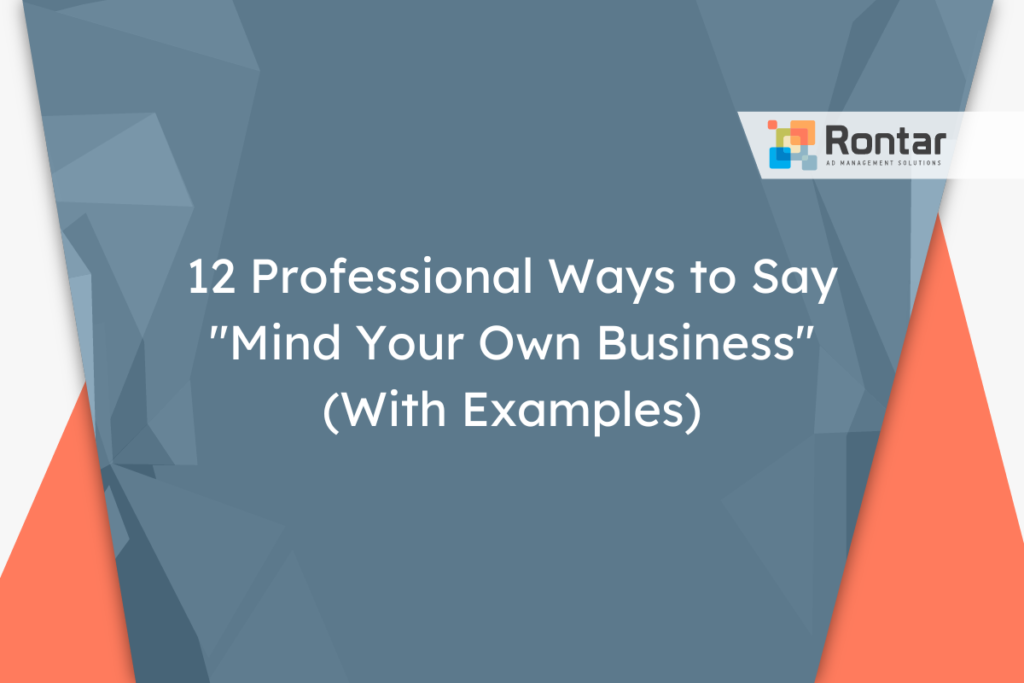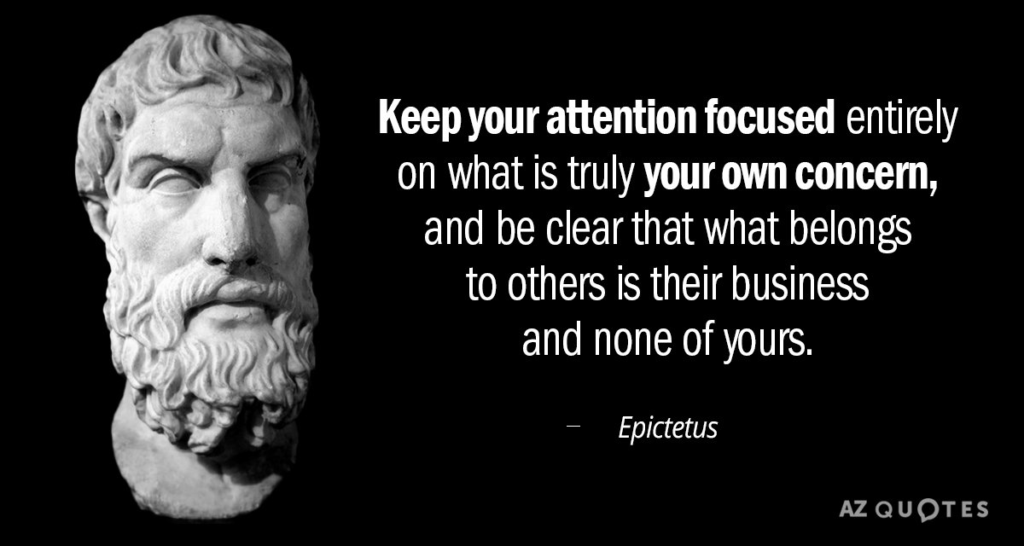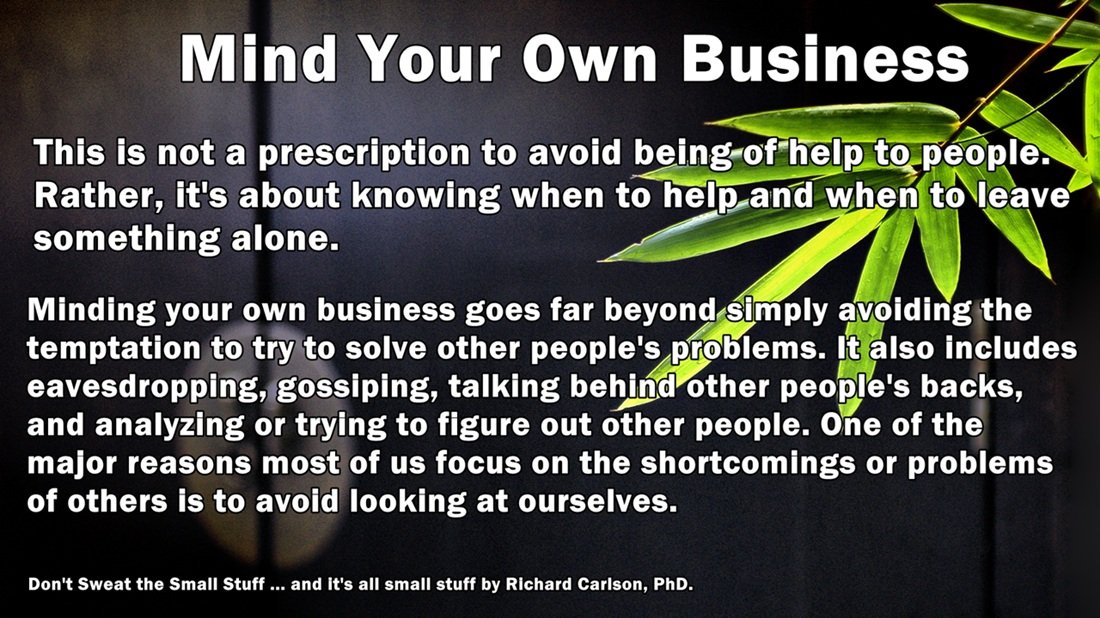How to Mind Your Own Business it’s easy to get caught up in other people’s affairs, whether it’s in the workplace, with family, or on social media. However, learning how to mind your own business is a crucial skill that can lead to a more peaceful and productive life. It allows you to focus on your own goals and maintain healthy relationships. In this article, we will discuss practical tips on how to mind your own business and why it’s essential for your mental and emotional well-being.
Why Mind Your Own Business?
Minding your own business isn’t just about staying out of other people’s personal lives. It’s about creating boundaries, respecting others’ space, and dedicating your energy toward personal growth. Here are some key reasons why it’s important to mind your own business:
- Mental Clarity: When you focus on yourself, you’re less likely to get overwhelmed with unnecessary stress and distractions.
- Strengthened Relationships: People appreciate when you respect their privacy, and this leads to stronger and healthier relationships.
- Increased Productivity: Staying focused on your own tasks and goals allows you to be more efficient and accomplish more.
- Personal Growth: By minding your own business, you can channel your time and energy into things that improve your life rather than spending it on things that don’t concern you.
The Benefits of Staying Out of Other People’s Affairs

Minding your own business is not only about staying clear of conflicts but also about ensuring that you’re improving your life by avoiding unnecessary drama. When you avoid gossip or interfering in others’ issues, you reduce stress and negativity, which can improve your overall well-being.
- Emotional Stability: When you don’t involve yourself in unnecessary drama, you protect your peace of mind.
- Building Trust: People are more likely to trust you if they feel you respect their privacy.
- Self-Respect: By focusing on your own life, you show that you value your time and energy.
Practical Tips on How to Mind Your Own Business
Now that we understand why it’s important to mind your own business, let’s look at some practical tips on how to do so effectively.
1. Focus on Your Own Goals
One of the easiest ways to mind your own business is to focus on your own goals. Whether you’re striving for success in your career, personal life, or health, setting clear objectives helps you stay on track and avoid getting sidetracked by other people’s lives.
- Set personal goals: Take time to reflect on what you want to achieve and set measurable goals.
- Prioritize your time: Make sure you’re dedicating enough time to your personal growth, whether it’s for work, learning a new skill, or improving your health.
- Use your energy wisely: Invest your time and energy into things that will benefit you, not into things you can’t control or don’t concern you.
2. Respect Others’ Privacy
It’s easy to get curious about what others are doing, but respecting their privacy is an important part of minding your own business. Remember, just because someone shares a part of their life doesn’t mean they want to share everything.
- Don’t eavesdrop: Avoid listening in on conversations that don’t involve you.
- Don’t ask intrusive questions: If someone doesn’t want to share details, respect their boundaries and don’t push for answers.
- Know when to stop: If you notice someone is uncomfortable, take the hint and stop probing.
3. Avoid Gossip and Negative Conversations
Gossip is one of the fastest ways to get involved in other people’s business. It’s easy to talk about others when you’re bored or trying to fit in, but this behavior can cause damage to relationships and lead to misunderstandings.
- Avoid spreading rumors: Gossiping can hurt others and cause unnecessary drama. Focus on positive and uplifting conversations instead.
- Don’t engage in toxic conversations: If others are gossiping, choose not to participate. You can politely change the subject or simply leave the conversation.
- Be mindful of your words: If you must speak about others, make sure you’re being kind, respectful, and constructive.
4. Establish Boundaries

Setting clear boundaries is essential to minding your own business. Boundaries help you maintain a healthy distance from situations that don’t concern you, while also giving you the space to focus on your own priorities.
- Communicate your limits: Be clear with others about what topics or actions you’re not comfortable with. For instance, if someone keeps venting about their personal issues, kindly ask if you can change the subject.
- Practice saying no: You don’t need to say yes to every request. If something isn’t your responsibility or doesn’t align with your priorities, it’s okay to politely decline.
- Take breaks from social media: Social media can be a breeding ground for unnecessary drama and gossip. Limit your exposure and take breaks when needed.
5. Respect Differences
Everyone has their own way of living, making decisions, and handling their personal affairs. It’s essential to recognize that not everyone shares the same values or experiences as you.
- Don’t judge others: Just because someone makes a choice you wouldn’t make doesn’t mean you should try to intervene or criticize. Remember, everyone has their own path.
- Embrace diversity: Respect different perspectives and experiences. By understanding others’ viewpoints, you can better focus on your own life without getting caught up in other people’s decisions.
- Mind your business, but be supportive: If someone asks for help or advice, offer it thoughtfully. If they don’t ask, however, don’t offer unsolicited advice.
How to Handle Situations Where You Feel the Urge to Intervene
Sometimes, it’s hard to resist the temptation to intervene, especially when it comes to people you care about. However, it’s important to know how to handle these situations wisely.
1. Assess the Situation
Before you act on any impulse to intervene, ask yourself if your involvement is necessary. Will it help the person? Or will it create more harm than good?
- Is it really your business? If the answer is no, resist the urge to get involved.
- Can they handle it on their own? Sometimes, people just need someone to listen, not to fix the situation.
- Is your intervention welcome? If someone hasn’t asked for your help, it might be best to stay out of it.
2. Offer Support, Not Control
If you must get involved, offer support rather than trying to control the situation. Be respectful of the other person’s autonomy, and offer assistance only if it’s needed or requested.
- Ask first: If someone is going through a tough time, ask if they want help before jumping in.
- Be a good listener: Sometimes, just listening without offering solutions can be the most helpful way to support someone.
3. Walk Away When Necessary

If the situation is clearly none of your business, or if someone asks you to back off, respect their wishes. Learning to walk away without feeling guilty is an important part of minding your own business.
- Don’t take it personally: If someone asks you to stay out of their business, don’t be offended. They may just need space.
- Let go of control: You can’t solve everyone’s problems, and sometimes, the best thing you can do is let them figure things out on their own.
Conclusion
How to Mind Your Own Business is an essential skill that can improve your personal life, relationships, and overall well-being. By focusing on your own goals, respecting others’ privacy, and setting healthy boundaries, you can create a more peaceful and productive environment for yourself and those around you. Remember, you don’t have to involve yourself in every situation. Stay focused on your own journey, and let others live theirs without unnecessary interference.
Disclaimer
The information provided in this article is for general guidance and informational purposes only. It is not intended as professional advice. The author and website are not responsible for any actions taken based on the content. Always seek professional advice when necessary for specific situations or concerns.










